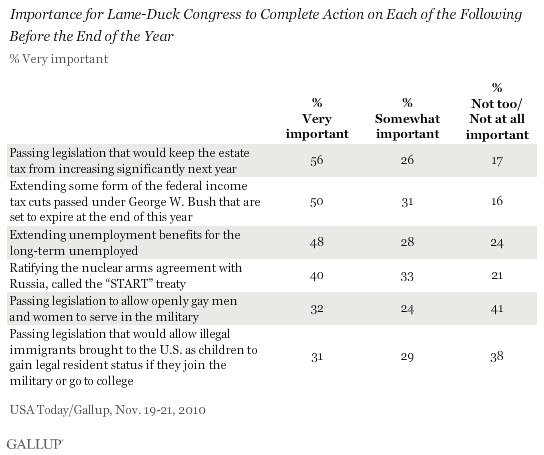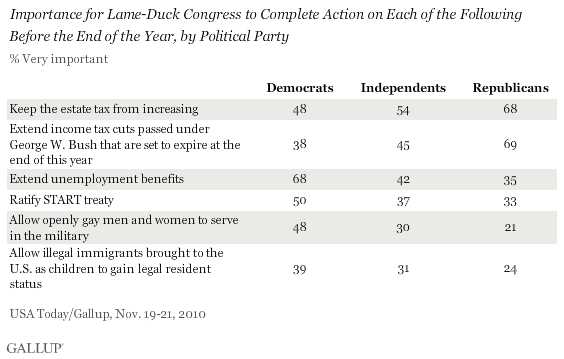PRINCETON, NJ -- Americans are most likely to say it is important for Congress to pass legislation to keep the estate tax from increasing significantly next year and to extend the income tax cuts passed under George W. Bush before the end of the year. Just under half say it is important for Congress to extend unemployment benefits for the long-term unemployed.

The Nov. 19-21 USA Today/Gallup poll asked Americans to rate the importance of six possible actions Congress may take between now and the end of the year, during its "lame duck" session prior to the new Congress' taking office at the beginning of 2011.
Of these, taxes appear to be Americans' highest priority. That could be in part because tax rates would change significantly for 2011 if Congress does not act by the end of this year. The income tax cuts that were a centerpiece of the Bush economic plan are set to expire at the end of this year unless Congress acts to extend them. Most in Congress seem to support at least a temporary extension, though there is disagreement as to whether any extension should apply to upper-income Americans, in addition to middle-income Americans.
Also, Congress suspended the estate tax for this year, but it is scheduled to go back into effect in 2011 at a higher rate than previously was the case, unless Congress votes otherwise.
Aside from taxes, Americans also believe it is important for Congress to extend unemployment benefits for the long-term unemployed, which will also expire without further congressional action. The House of Representatives last week defeated a bill that would have extended unemployment compensation before the benefits run out for some Americans on Nov. 30, because of concerns about how the bill would be funded.
Americans seem somewhat less enthusiastic about other policies the Obama administration hopes to get passed by the end of the year, including repealing the "Don't Ask, Don't Tell" policy that prohibits openly gay men and women from serving in the U.S. military, and passing the "DREAM" Act that would provide a pathway to citizenship for illegal immigrants living in the U.S. who were brought to the country as children. Fewer than one in three say it is very important for Congress to do each by the end of the year. Four in 10 believe it is very important for Congress to ratify the START treaty that would lead to reductions in U.S. and Russian nuclear weapons.
Republican, Democratic Priorities Do Not Align
Priorities for Congress differ significantly by party. Close to 7 in 10 Republicans say it is very important to extend the income tax cuts and to prevent the estate tax from increasing significantly. Only half as many Republicans rate any of the other issues as extremely important. Extending unemployment benefits is easily Democrats' top priority. Half of Democrats say it is very important to ratify the START nuclear arms treaty with Russia.

Republicans' and Democrats' priorities differ most on extending the income tax cuts and extending unemployment benefits. In general, independents' priorities mirror those for all Americans.
Implications
Americans appear eager for Congress to take action on tax issues and unemployment benefits before the end of the year. This lame-duck session for Congress promises to be eventful regardless of how the pressing issues it must address are ultimately decided. Until the end of the year, the Democratic Party will maintain large majorities in both houses of Congress, although the results of the midterm elections may give Democratic members pause as to how they choose to address some of these issues. There does appear to be consensus among both parties in Congress to extend unemployment benefits and to extend the income tax cuts, though currently not enough agreement on the details of how to accomplish these.
Survey Methods
Results for this USA Today/Gallup poll are based on telephone interviews conducted Nov. 19-21, 2010, with a random sample of 1,037 adults, aged 18 and older, living in the continental U.S., selected using random-digit-dial sampling.
For results based on the total sample of national adults, one can say with 95% confidence that the maximum margin of sampling error is ±4 percentage points.
Interviews are conducted with respondents on landline telephones (for respondents with a landline telephone) and cellular phones (for respondents who are cell phone-only). Each sample includes a minimum quota of 150 cell phone-only respondents and 850 landline respondents, with additional minimum quotas among landline respondents for gender within region. Landline respondents are chosen at random within each household on the basis of which member had the most recent birthday.
Samples are weighted by gender, age, race, education, region, and phone lines. Demographic weighting targets are based on the March 2009 Current Population Survey figures for the aged 18 and older non-institutionalized population living in continental U.S. telephone households. All reported margins of sampling error include the computed design effects for weighting and sample design.
In addition to sampling error, question wording and practical difficulties in conducting surveys can introduce error or bias into the findings of public opinion polls.
View methodology, full question results, and trend data.
For more details on Gallup's polling methodology, visit www.gallup.com.
